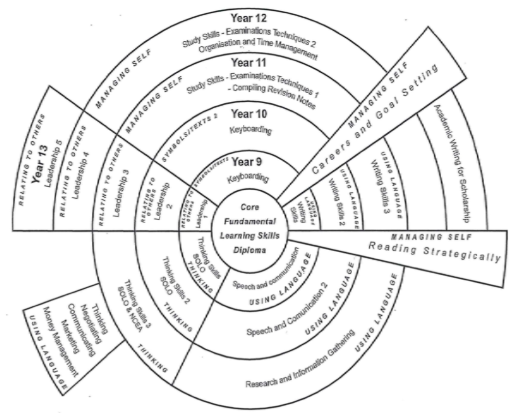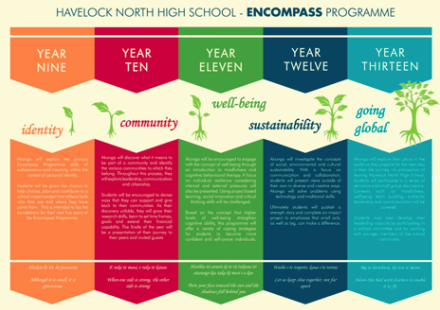Greg Fenton, principal of Havelock North High School, shares some of the highlights from his recent sabbatical where he explored how to further engage students in lifelong learning.
In the NZC document there is a clear intent articulated around the idea of lifelong learning underpinned by the key competencies. However despite an initial flurry to align what was being done in schools with the competencies when the document was first published, other priorities have meant that the essence of this process of learning, whilst not being entirely lost, has been largely left to chance rather than as a focused priority.
I was cynical at the time over the approach, as little real energy was given to ensuring that they were being integrated into the curriculum and it was another case of ticking the box to meet someone’s key performance indicators (KPIs). Teachers at the time were inundated with the ongoing refinement of NCEA, the alignment, the realignment and the ongoing issues around marking, moderation, and the writing and rewriting of standards.
I was becoming more and more frustrated that the curriculum was being driven by assessment and one of the key principles – learning how to learn – which underpins the idea of the lifelong learner, was being left to chance, as a by-product.
A toolkit of skills
I strongly believe we need to work with our students to not only give them a purpose, but to also ensure they have a toolkit (kete) of skills which enable them to engage with the vision of the New Zealand Curriculum; that being – confident, connected, actively involved, lifelong learners.
My goal at our school is to target attention on this aspect of learning. At Havelock North High School we are justifiably proud of the attainments of our students. In the past five years we have seen NCEA results improve significantly, and our staff are owed a huge thank you for their part in this.
We have done this in an environment where the education is authentic, academic, and not dumbed down as in some schools. This is evidenced by the number of external achievement standards we are offering compared with other schools and the percentage of merits and excellences our students are delivering. We do this from a position of wanting our students to have a range of options including tertiary study; but more than anything we want them to engage with the joy of learning and the lifelong involvement with this crucial aspect of their lives.
My frustration comes partly from my own personal experience as a learner at high school; someone who had a fixed mindset fuelled by getting by for most of my schooling on natural ability, being in a top stream class and generally doing well with little effort. Unfortunately for me this attitude and spending too much time playing sport caught up with me, when I was left off the UE accreditation list. Needless to say I pulled up my socks quickly.
As I progressed in education I have come to better understand what Carol Dweck labels the "Growth Mindset", and to me part of this is in having the tools to unpack difficult tasks rather than side-stepping them.
I have loosely used the term generic skills as being the toolkit (kete) to facilitate this and believe that all learners benefit when they have a purpose but also have an understanding of how to write productively, read strategically, and to deal with the academic challenges they have in their school lives.
Invitational learning
While it is easy to articulate a frustration, it is much more challenging in a system driven by assessment to take action. However such has been the speed of change in recent times, to not take action to support our students is unacceptable. Thankfully I have a staff who share this view.
This future world our students head into is obviously difficult to predict, such is the speed of change; but what we are hearing increasingly from business is that they are placing increasing value on generic skills, such as critical thinking, collaborative problem solving, and global literacy.
As a school we decided to embrace this idea. Our strong academic programme and success would still be front and centre, because we are also aware of the rising academic ceiling in the world. But we would endeavour also to shape our timetable to place an emphasis on developing in our students this "kete" of skills, which would advantage them in their engagement with lifelong learning, and also in their next steps beyond secondary school.
Purkey (Novak & Purkey, 2001; Purkey, 1992) terms this idea “Invitational Learning”, which works from the meaning of invitational as “offering something beneficial for consideration”. His claim is that we need to create schools that invite, or cordially summon students to be involved in the learning process.
This model is based on four propositions:
- Trust, in that we need to convince not coerce others to engage in what we would like them to consider worthwhile activities
- Respect, in that we adopt caring and appropriate behaviours when treating others
- Optimism, in seeking the untapped potential and uniqueness in others
- Intentionality, in which we create programmes by people designed to invite learning
The key concept here is that we invite students into the learning process and they do so because they see value in it and have confidence that they have the skills to tackle the learning challenges that they will inevitably meet. I have long been concerned that many students do not accept the invitation because they lack direction, they lack confidence (Growth Mindset), and they lack fundamental skills to engage with the learning process.
This process of invitational learning aligns directly with what John Hattie is saying in his renowned text Visible Learning.
“The most powerful effects of the school relate to features within schools, such as the climate of the classroom, peer influences, and the lack of disruptive students in the classroom – all of which allow students and teachers to make errors and develop reputations as learners, and which provide an invitation to learn.”
(Hattie. J. 2009, P33)
Encompass programme
Following a number of staff meetings, our staff met to flesh out the types of skills that they saw as being important for the students, and also to identify best practice in a range of both learning skills and soft skills. Students in year 13 were posed with questions such as: ”What do you wish that you had learnt at school which you hadn’t had the opportunity to do?” and hence along with input from other stakeholders contributed to a co-construction of the programme.
The outcome has been our "Encompass" programme which is being rolled out in 2018. Our initial model was built around a series of skills as outlined in Figure 1.
Fig.1 Core fundamental learning skills
We have further refined the programme to reflect the evolving thoughts of the teaching staff around course principles, staffing, staff professional development, and resources. The essence of this is communicated through Figure 2 that illustrates the themes on which the programme is being built.
Fig.2 Encompass programme
We then set about working out where best to fit it into our timetable, and as a consequence changed the timetable to find two extra periods in each timetable cycle to enable the teaching of the course, as opposed to waiting and hoping that the skills would be absorbed through osmosis.
All of our staff have continued to work in small collaborative groups (hubs), to develop the courses and generate resources. While still in its early stages, the programme is beginning to gather momentum. We are excited about its potential and while obvious benefits will take time, in the long term we are looking to develop more confident learners who are equipped with both functional and soft skills for their future within education and in the wider community.
The programme principles are based around the following points:
- Skills will be generic and not to do with subject selections
- The programme will be project based and hands-on
- There will be NO credits attached to the course
- The course will be reported on
- There will be a combination of group and individual work
- The course is built around the acquisition of soft skills which make the student a better learner and more employable.



